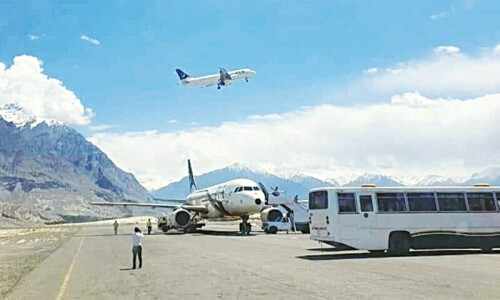KARACHI: An interactive session on the socio-economic situation in drought-hit Tharparkar district was informed on Tuesday that a similar crisis was brewing in at least eight more districts of Sindh.
Organised by the Pakistan Institute of Labour Education and Research (Piler), the discussion was held at PMA House on Tuesday.
“The deaths that occurred in Tharparkar are a direct result of the government’s apathy and incompetence. A similar crisis is brewing in at least eight more districts of the province, but no attention is being paid to it. The state’s development paradigm, which is pro-elite, is deeply flawed. It has no space for the marginalised,” said G.R. Baloch representing the Pakistan Relief Foundation at the discussion.
He also suggested that corporate organisations working in Thar should come forward to help out in the current crisis.
Spread across 22,000 kilometres, Tharparkar is one of the most sparsely populated areas with a population of 1,200,000. The ongoing situation in Thar has affected around 700,000 people in the last one year due to, what speakers said, the worsening environmental crisis.
Dr Sono Khangharani, of the Hisaar Foundation, said that extreme poverty and drought had been recurring in Thar since the late 1980s, which was largely exacerbated by “wrong policies of the past”. Explaining, he gave an example of 1985, when, he said, it was difficult to get approval for a development project for Thar. “Thar was always seen as a high alert security area and rarely considered for development projects. The prime minister at the time, Mohammad Khan Junejo, formed an Arid Zone Development Authority, but it’s dysfunctional now. What we are seeing now is a spillover of years of negligence.”
Dr Sono said that female literacy in Tharparkar improved in recent times, standing at 16pc. With improved communication systems and the trend of early marriages, most couples opted for delivery in hospitals that he said was a different trend from the traditionally prevalent option of going for a midwife.
For sustainable development in the district, he said, a mitigation centre should be set up to record and fight such crises.
Apart from serious infrastructure issues, the situation in Thar also brought to the fore other less spoken-about developments in the area.
The increasing fundamentalism in the province had also made its way to the outskirts of Tharparkar, where, according to the speakers, a major population of Hindus lived. Over the years, the speakers claimed that construction of madressahs around the district had worried the Hindu residents, apart from creating limited opportunities of education for them.
The head of social science department at SZABIST, Dr Riaz Sheikh said: “Rather than pursuing establishment of community centres, we should ask the government to invest in medical centres across Thar. This will end half of their problems, as timely medical attention is what they need the most.”
He said if the situation of a permanent crisis in the marginalised district was to change, efforts would have to be taken at the macro level.
Assistant director of the PDMA Mohammad Nawaz said the government had been working to address the fundamental issues in the region, including the water deficit. “PDMA has strengthened the documentation of disaster prone regions, which facilitates the process of relief and rehabilitation assistance,” he said.
Repeating what the other panelists said, he admitted that the region needed long-term development but for that civil society and other humanitarian organisations should also “help the government in tackling such crisis rather than point fingers”.















































Dear visitor, the comments section is undergoing an overhaul and will return soon.